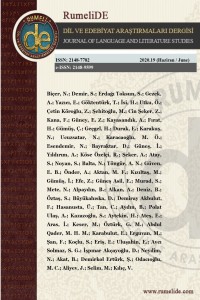Abstract
Felsefi ve sosyolojik açıdan Postmodernizm’in en çok hangi alana/disipline yansıdığı sorusuna bir cevap bulmak aslında güç değildir. “Postmodern müzik” veya “postmodern sinema” gibi kavramlar “postmodern edebiyat” kadar sık duyulmamaktadır. Ayrıca Lyotard’ın disiplinlerarası ayrımı reddetmesi ve Postmodernite ile birlikte “interdisipliner” ile “transdisipliner” gibi kavramların önem kazanması gibi gerçekler göz önünde bulundurulduğunda Postmodernizm’in edebiyat disiplini ile ilişkisini vurgulamak bu açıdan “mantık dışı”dır. Buna rağmen, “Postmodernizm” ve “roman”ı iki farklı disipline ait kavramlar olarak görsek bile, birbirlerine olan bağları oldukça sıkıdır. Edebiyatın anlatı dünyasının belki de en büyük ürünü olan romanın Postmodernizm’den aldıkları romanı farklı bir boyuta taşımıştır. Postmodern roman göze ilk bakışta bir dönem gibi görünse de bir türdür. Modernite sonrası dönemde yazılmış her romanın postmodern roman olduğunu iddia edemeyiz. Postmodern romanı postmodern roman yapan metinlerarasılık, üstkurmaca gibi öğeler modernite sonrası yazılmış her romanda mevcut değildir. Bunların dışında (bazıları alt tür) montaj, kolaj, pastiş, parodi, ironi gibi tekniklerde de aynı durum söz konusudur. Yazarın dehasını ve okurun aptallığını ön plana süren postmodernist romancı/roman yazarı sayısı, geri kalan sayısız roman yazarının yanında sınırlıdır. Dünyada Italo Calvino, Umberto Eco, Paul Auster, Patrick Süskind; Türk edebiyatından Oğuz Atay, Orhan Pamuk gibi sınırlı sayıda romancılar postmodern roman örnekleri sunmaktadır. Bu çalışmada, okuma süreci “kaliteli” okur için oldukça yorucu ama bir o kadar zevkli olan, “aptal” okura ancak sınırlı bilgi sunan postmodern romanlar tartışılmaktadır. Postmodern romanların, postmodern öğelerinin neler oldukları irdelenmekte ve okurun bu öğelerden biri haline nasıl dönüştüğü sorgulanmaktadır.
Keywords
References
- Aytaç, G. (2016). Genel Edebiyat Bilimi. Ankara: Doğu Batı.
- Best, S. & Kellner, D. (2016). Postmodern Teori. İstanbul: Ayrıntı.
- Derrida, J. (1997). Of Grammatology. London: Johns Hopkins.
- Eco, U. (2019). Anlatı Ormanlarında Altı Gezinti. İstanbul: Can.
- Ecevit, Y. (1996). Orhan Pamuk’u Okumak. İstanbul Gerçek.
- Ecevit, Y. (2016). Türk Romanında Postmodernist Açılımlar. İstanbul: İletişim.
- Eliuz, Ü. (2016). Oyunda Oyun Postmodern Roman. İstanbul: Kesit.
- Hassan, I. (2019). Orpheus’un Parçalanışı: Postmodern Bir Edebiyata Doğru. Ankara: Hece.
- Koçakoğlu, B. (2012). Anlamsızlığın Anlamı Postmodernizm. Ankara: Hece.
- Lyotard, J-F. (2014). Postmodern Durum. Ankara: BilgeSu.
- Rose, M. A. (2016). Parodi: Antik, Modern ve Postmodern, Ankara: Hece.
- Sarup, M. (2019). Post-Yapısalcılık ve Postmodernizm. Ankara: Pharmakon.
- Stevick, P. (2017). Roman Teorisi. Ankara: Akçağ.
Abstract
Postmodernity, whose connection with modernity has not yet been fully revealed, has carried itself beyond being a philosophical and sociological value system. It is possible to see postmodernism in literature, cinema, music, architecture and plastic arts today. Postmodernism, which can conceptually date back to 1870s through the painter Chapman, in fact, made its presence felt in the 1960s. The reflection of the concept in literature, which has been discussed by some platforms today about whether it is a period or a current, is quite interesting. We see a trend in the literature that pushes aside the traditions and judgments that have been created up to that day and does not care about this situation. From a philosophical and sociological point of view, it is actually not difficult to find an answer to the question of which field/discipline Postmodernism is reflected in the most. Concepts such as "postmodern music" or "postmodern cinema" are not heard as often as "postmodern literature". In addition, when facts such as Lyotard's refusal of interdisciplinary distinction and concepts such as "interdisciplinary" and "transdisciplinary" gaining importance together with Postmodernity are concerned, it is "irrational" in this respect to emphasize the relationship of postmodernism with the discipline of literature. Still, even though we see "postmodernism" and "novel" as concepts belonging to two different disciplines, their connection to each other is quite tight. The things that the novel, perhaps the biggest product of the narrative world of literature, took from Postmodernism, carried the novel to a different dimension. Although the postmodern novel may seem like a period at first glance, it is a genre. We cannot claim that every novel written in the postmodern period is a postmodern novel. Elements such as intertextuality and metafiction that give postmodern novels their unique characteristics are not present in every novel written after Modernity. Apart from these, the same situation is valid in techniques such as montage, collage, pastiche, parody, irony (some of which are subgenres). The number of postmodernist novelists who put forward the genius of the writer and the stupidity of the reader is limited compared to the countless remaining novelists. Novelists, who are not limited to names such as Italo Calvino, Umberto Eco, Paul Auster, Patrick Süskind in the world, and Oğuz Atay, Orhan Pamuk in Turkish literature, but are still limited, offer postmodern novels. In this study, postmodern novels, whose reading process is rather exhausting but equally pleasurable for "quality" readers, and which offer only limited information to "stupid" readers, are discussed. The study examines what the postmodern elements of postmodern novels are and how the reader turns into one of these elements.
Keywords
References
- Aytaç, G. (2016). Genel Edebiyat Bilimi. Ankara: Doğu Batı.
- Best, S. & Kellner, D. (2016). Postmodern Teori. İstanbul: Ayrıntı.
- Derrida, J. (1997). Of Grammatology. London: Johns Hopkins.
- Eco, U. (2019). Anlatı Ormanlarında Altı Gezinti. İstanbul: Can.
- Ecevit, Y. (1996). Orhan Pamuk’u Okumak. İstanbul Gerçek.
- Ecevit, Y. (2016). Türk Romanında Postmodernist Açılımlar. İstanbul: İletişim.
- Eliuz, Ü. (2016). Oyunda Oyun Postmodern Roman. İstanbul: Kesit.
- Hassan, I. (2019). Orpheus’un Parçalanışı: Postmodern Bir Edebiyata Doğru. Ankara: Hece.
- Koçakoğlu, B. (2012). Anlamsızlığın Anlamı Postmodernizm. Ankara: Hece.
- Lyotard, J-F. (2014). Postmodern Durum. Ankara: BilgeSu.
- Rose, M. A. (2016). Parodi: Antik, Modern ve Postmodern, Ankara: Hece.
- Sarup, M. (2019). Post-Yapısalcılık ve Postmodernizm. Ankara: Pharmakon.
- Stevick, P. (2017). Roman Teorisi. Ankara: Akçağ.
Details
| Primary Language | Turkish |
|---|---|
| Subjects | Creative Arts and Writing |
| Journal Section | Turkish language, culture and literature |
| Authors | |
| Publication Date | June 21, 2020 |
| Published in Issue | Year 2020 Issue: 19 |


